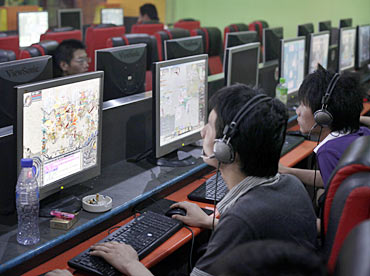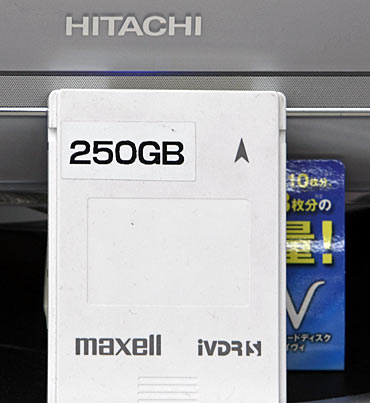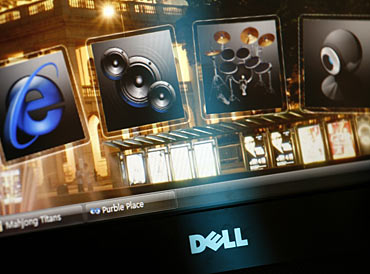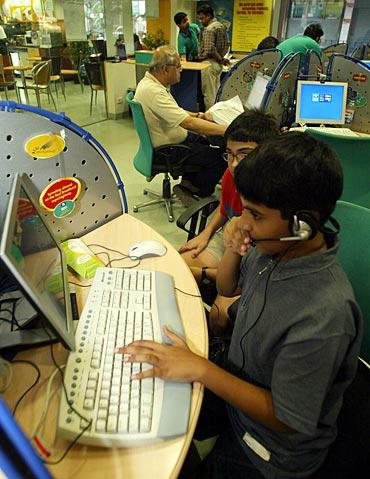
For all the gaming enthuiasts out there, Get Ahead reader K Sampanna gives you the lowdown on Gaming PCs.
Gaming PCs, as the name suggests, are computers built with the main intent of playing the latest PC games. While this is a popular concept in the west, in India, it is yet to reach its maximum potential. It could be due to the components being more expensive in India, as also due to the fact that gaming culture is not very advanced (for eg: the last edition of Call of Duty franchise -- Modern Warfare II, sold millions of copies in the United States alone, while in India it garnered barely a few thousand). Also in India, the whole 'gaming PC' concept is rather frowned upon due to the belief that it is a waste of money and time, thanks to skeptical authorities (read parents, teachers, etc).
This is sad because there is a lot of potential in them. Other than playing the latest iterations of the games, these can also serve as an excellent benchmark for running applications. Since the latest games themselves are usually resource intensive (require a good CPU, memory and graphic card(s)), building a PC which can run those smoothly means you also have one which can easily handle any apps you throw at them, like Photoshop, Premier Pro, 3dMax, etc. Of course, most folks just need a PC for the Internet and MS Office, but hey, even they can benefit from buying a low-cost gaming PC, which will be at least a few years future-proof.
With that said, let us delve into what goes into building a balanced gaming PC:
Processor
Also called the CPU, it is the 'brains' of the entire system. Processors have something called 'core count', which is actually, the number of processing dies on a single chip, which can handle data processing. Most of the processors today are atleast dual cores (with the exception of AMD's Sempron or Intel's Atom). As a rough thumb-rule, more the number of cores, the better it is.
Thus for a given manufacturer, say AMD, in the order of performance: dual cores < triple cores < quad cores < hexacores. Remember, this is valid only if you stick to one manufacturer. For eg, Intel has some quad core models which perform better than the hexacore AMDs. Intel also tends to offer more performance per core than AMD, but AMD offers better value.
For the latest as well as any upcoming games, you should aim for at least a dual core with a speed greater than about 2.5GHz. Obviously, triple or quad cores are more preferable.
Motherboard
Basically, it is a circuit board which houses the components like CPU, RAM, etc and also enables communication between them through data pathways. I could write an entire thesis about motherboards, but that would be beyond the scope of this article. Motherboards have something called "chipsets", which govern compatibility with processors and memory.
While looking for a motherboard, you should consider the number of memory (RAM) slots, the slots available for installing graphic cards, its overclocking potential (overclocking means forcing the CPU to run at a higher speed, for performance gains). Besides Intel, the other well known motherboard manufacturers are ASUS, Gigabyte, EVGA.
In fact, these manufacturers account for the bulk of the sales of motherboards overseas, as opposed to India, where Intel still rules the roost.
Check out: The all new Gadgets and Gaming page
Reader invite
Are you a gadget/gaming wizard/afficianado? Would you like to write on gadgets, gaming, the Internet, software technologies, OSs and the works for us? Send us a sample of your writing to gadgetsandgaming@rediffmail.com with the subject as 'I'm a tech wizard/afficianado' and we will get in touch with you.

More commonly known as RAM, it is actually a flat, thin rectangular slab which usually comes in sizes of 1 GB, 2 GB and 4 GB. It has three types -- DDR, DDR2 and DDR3. DDR is almost extinct, plus it is not supported on the newer chipsets. DDR2 is most common and DDR3 is poised to catch up with it.
You have to check whether the motherboard is compatible with DDR2, DDR3, or both. For eg: Intel's latest i-Series processors (i3, i5, i7) require exclusively DDR3. The older Core 2 Duos, Core 2 Quads have support for both. DDR3 has a faster data rate than DDR2 and is more expensive.
For gaming, you should gun for a minimum of 2 GB RAM. Doesn't matter if it is DDR2 or DDR3. But since DDR3 is the future, you might as well go for it.
Graphic card
This is the processing unit, other than the CPU, which handles graphical duties of applications. This is a relatively nascent concept in India, where a majority of computers still function on on-board graphics (graphics integrated into the motherboard). While this might be good enough for general programs or older games, it won't cut it for the latest or upcoming games.
You need to have a decent graphic card with atleast 512MB of video RAM to run games smoothly. Having one with DirectX 11 capabilities is an added perk, since that is the latest DirectX platform which will be the basis for upcoming games. Both Nvidia and ATI have Dx 11 cards. Graphic card is the single most important entity for games.
Hard disk (HDD)
This is the storage medium where you keep all your programs, movies, songs, etc. A 320-500GB HDD is sufficient for most. Well known manufacturers include Samsung, Western Digital, Seagate, Hitachi, etc.
Solid State Drive (SSD)
This storage medium differs from the traditional HDD in construction and operation. It is much faster than HDDs but also much more expensive. Case in point: 1TB HDD (1024 GB) will cost around Rs 3,500-4,000, while a 256 GB SSD costs around Rs 25,000.
SSDs are not really required for gaming, but they are worth a mention.
Power supply
Probably the most underrated component. A power supply fetches power from the mains and feeds it to the computer after converting it to DC (since computers cannot function on AC). A good solid power supply will not only just provide sufficient power, it lasts long and protects against over-volting.
Power supply requirements depend primarily upon the number of graphic cards used, the power they consume. Well known manufacturers include Corsair, Antec, Seasonic, Enermax. Sadly, these are scarce in India, where you usually get names like Cooler master, Zebronics, FSP, VIP, etc.

The case houses all the components. Case cooling is an important factor, wherein the fan arrangement within the case should be such that it should exhaust hot air into the atmosphere. A case should also be easily accessible, have a tool-free design so that the other components could be easily assembled. Aesthetics could be important to some people, while functionality is paramount to others.
Ideally, a gaming case should have enough room for manoeuver / expansion of components. It should also be big enough so that there is enough ventilation.
Display
LCDs are the in-thing today and they have replaced CRT displays of yore. A good 19-20" display can be had for as low as Rs 6,000. Full HD displays cost upwards of Rs 10,000.
Optical drive
This is more commonly known as DVD-RW and are vailable dirt cheap nowadays. Sony, LG, Lite-On are some of the trusted names. Blu-Ray ROM is the latest thing, but very expensive. A Blu-Ray burner is even more so.

We look at three Gaming PCs within three different budgets, considering the availability of components in India. As of now, these PCs are the best you could get for gaming (and for any other programs) at the given budget. The list is not definitive, since technology advances exponentially, and prices fluctuate. The list most probably won't be valid after a few months; it is most relevant for now.
Also note that I've not included displays, since the choice is so vast, it is impossible to cover even half of them. While going for a display, get as much resolution as you can within your budget. Look out for response times (should be <5 ms grey to grey), a high dynamic contrast ratio (>20000:1). Samsung, LG, Viewsonic, AOC make some good panels.
Budget PC: Rs 20,000
Mid-range PC: Rs 40,000
Enthusiast PC: Rs 60,000